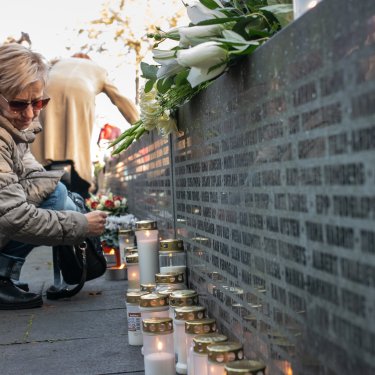Sweden: Right to information must prevail in trial for filming ferry wreck

Reporters Without Borders (RSF) says the right to information should prevail in the case of a Swedish documentary filmmaker charged with “violating a burial site” for filming the underwater wreck of a ferry containing the remains of hundreds of people who died when it sank in 1994.
Update: On 8 February 2021, the Gothenburg court ruled that Henrik Evertsson and Linus Andersson were not guilty of "violating a burial site" when filming the M/S Estonia shipwreck.
Henrik Evertsson, the co-director of a new documentary series entitled “Estonia: the Discovery that Changes Everything,” and a member of his crew, camera operator Linus Andersson, are facing the possibility of two-year jail sentences in an unprecedented trial due to begin in Göteborg in January.
The series, which Discovery Networks began broadcasting on 28 September, examines the circumstances in which the ferry, the MS Estonia, sank in international waters in the Baltic Sea while on its way from Tallinn to Stockholm on 28 September 1994. A total of 852 people, mostly from Sweden, Estonia and Finland, died in what was the worst maritime disaster since the Titanic.
The filmmakers’ underwater camera discovered a 4-metre hole in the side of the ferry’s hull that casts doubt on the official version whereby it sank because of a flaw in its bow door. The documentary includes interviews with the families of victims who also voice doubts about the findings that an international commission issued in 1997.
The hole in the side of the hull was filmed by a remote-controlled camera operated by Andersson that was attached to an underwater vehicle. During the underwater filming, which was supervised by the Finnish coastguard, the remote vehicle and its attached camera never went inside the wreck, which was officially declared to be a burial site under an agreement between Sweden, Finland and Estonia in 1995.
“The documentary made by Henrik Evertsson and his crew is a response to the request of many of the victims’ families to continue investigating the causes of the shipwreck and find out what really happened on that terrible night in September 1994,” said Pavol Szalai, the head of RSF’s EU and Balkans desk. “We ask the prosecutor and court to ensure that the fundamental right to information prevails. This journalist acted in the public interest.”
RSF Sweden president Erik Halkjaer said Evertsson had shown the vital role that journalism can play in informing the authorities. “Regardless of the origin of the hole in the wreck that this series revealed, this documentary has led the Swedish, Finnish and Estonian governments to regard the discovery as extremely important, to the point of opening new inquiries,” Halkjaer said.
Sweden is ranked 4th out of 180 countries in RSF's 2020 World Press Freedom Index.



